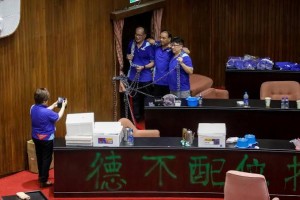Fighting erupted in Taiwan’s parliament on Monday as lawmakers from the ruling Democratic Progressive Party (DPP) broke through barricades erected by the main opposition Kuomintang (KMT) who had occupied it to protest against government “tyranny”.

Taiwan is a rambunctious democracy and fights and protests inside the parliament building are not an uncommon occurrence.
More than 20 KMT lawmakers occupied the legislature overnight on Monday, blocking entry to the main chamber with chains and chairs, saying the government was trying to force through legislation and demanding the president withdraw the nomination of a close aide to a high-level watchdog.
Late morning on Monday, DPP lawmakers pulled down the barricades and forced their way in, surrounding the main podium where their KMT opposite numbers had holed up.
There were scuffles and shouting as the KMT, including its youthful new chairman Johnny Chiang, struggled to hold their position. Chiang left the podium, appearing to be pulled out a side door, before returning to the floor.
A more peaceful scene soon resumed with KMT lawmakers standing in protest at the front of the podium, and DPP legislators behind them, as they took turns shouting slogans.
The KMT, trounced in January’s parliamentary and presidential elections, began their protest in parliament late Sunday. The party traditionally favours close ties with China, which claims Taiwan as its own territory.
The KMT said it was protesting the DPP and President Tsai Ing-wen’s forcing though of bills and Tsai’s nomination of her senior aide Chen Chu to head the Control Yuan, a government watchdog.
“This year, the Tsai administration has become more tyrannical than before,” the KMT said in a statement. “Tsai’s obstinacy had left the KMT with no alternative but to occupy the Legislative Yuan for a parliamentary boycott.”
The DPP has a large parliamentary majority.
Both the DPP and the presidential office condemned the action, with the DPP saying the KMT was orchestrating a “farce”.
In 2014, hundreds of students occupied parliament for weeks in protests nicknamed the Sunflower Movement, demanding more transparency and fearful of China’s growing economic and political influence on the island.
Reuters


Share your thoughts